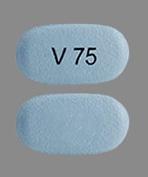Ivacaftor / Tezacaftor Side Effects
Medically reviewed by Drugs.com. Last updated on Jul 28, 2025.
Applies to ivacaftor / tezacaftor: oral tablet.
Precautions
It is very important that your doctor check your or your child's progress at regular visits to make sure that this medicine is working properly. Blood tests will be needed to check for unwanted effects.
Do not use this medicine together with carbamazepine (Carbatrol®, Equetro®, Tegretol®), rifabutin (Mycobutin®), rifampin (Rifamate®, Rifater®), phenobarbital (Luminal®), phenytoin (Dilantin®), or St John’s wort.
This medicine may cause serious allergic reaction, including anaphylaxis, which can be life-threatening and requires immediate medical attention. Check with your doctor right away if you have chest tightness, cough, difficulty swallowing, dizziness, fast heartbeat, hives, itching, skin rash, puffiness or swelling of the eyelids or around the eyes, face, lips, or tongue, trouble breathing, or unusual tiredness or weakness.
This medicine may cause dizziness. Do not drive or do anything else that could be dangerous unless you know how this medicine affects you.
Check with your doctor right away if blurred vision, difficulty with reading, or any other change in vision occurs during or after treatment. Your doctor may want your eyes be checked by an ophthalmologist (eye doctor).
Do not take other medicines unless they have been discussed with your doctor. This includes prescription or nonprescription (over-the-counter [OTC]) medicines and herbal or vitamin supplements.
Other side effects
Some side effects of ivacaftor / tezacaftor may occur that usually do not need medical attention. These side effects may go away during treatment as your body adjusts to the medicine. Also, your health care professional may be able to tell you about ways to prevent or reduce some of these side effects.
Check with your health care professional if any of the following side effects continue or are bothersome or if you have any questions about them:
More common side effects
Less common side effects
- stuffy nose
Serious side effects
Along with its needed effects, ivacaftor/tezacaftor may cause some unwanted effects. Although not all of these side effects may occur, if they do occur they may need medical attention.
Check with your doctor immediately if any of the following side effects occur while taking ivacaftor / tezacaftor:
Rare side effects
- nausea
- severe constipation
- stomach pain
- vomiting
Incidence not known
- blindness
- blurred vision
- chest tightness
- cough
- dark urine
- decreased vision
- difficulty swallowing
- dizziness
- fast heartbeat
- hives, itching, skin rash
- light-colored stools
- loss of appetite
- puffiness or swelling of the eyelids or around the eyes, face, lips, or tongue
- trouble breathing
- yellow skin or eyes
See also:
For healthcare professionals
Applies to ivacaftor / tezacaftor: oral tablet.
General adverse events
The most commonly reported side effects have included headache, nasopharyngitis, nausea, sinus congestion, and dizziness.[Ref]
Nervous system
- Very common (10% or more): Headache (14%)
- Common (1% to 10%): Dizziness
Ocular
- Frequency not reported: Non-congenital lens opacities
Respiratory
- Common (1% to 10%): Sinus congestion
Gastrointestinal
- Common (1% to 10%): Nausea
- Uncommon (0.1% to 1%): Distal intestinal obstruction syndrome
Hepatic
- Common (1% to 10%): Transaminase elevations
The incidence of maximum transaminase (ALT or AST) elevations to greater than 8 times the upper limit of normal (8 x ULN), greater than 5 x ULN, or greater than 3 x ULN was similar between drug treated and placebo treated patients (0.2%, 1%, 3.4% versus 0.4%, 1%, 3.4%, respectively). A total of 3 patients in clinical trials permanently discontinued therapy due to elevated transaminases (1 drug treated and 2 on placebo). No drug-treated patient experienced a transaminase elevation greater than 3 x ULN associated with elevated total bilirubin greater than 2 x ULN.
References
1. (2022) "Product Information. Symdeko (ivacaftor-tezacaftor)." Vertex Pharmaceuticals
Frequently asked questions
- How does Symdeko work?
- What is the difference between Symdeko and Orkambi?
- What is the difference between Symdeko and Kalydeco?
More about ivacaftor / tezacaftor
- Check interactions
- Compare alternatives
- Dosage information
- During pregnancy
- Drug class: CFTR combinations
- En español
Patient resources
Other brands
Professional resources
Other brands
Related treatment guides
Further information
Ivacaftor/tezacaftor side effects can vary depending on the individual. Always consult your healthcare provider to ensure the information displayed on this page applies to your personal circumstances.
Note: Medication side effects may be underreported. If you are experiencing side effects that are not listed, submit a report to the FDA by following this guide.

